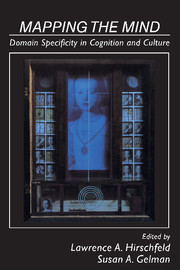Book contents
- Frontmatter
- Contents
- List of contributors
- Preface
- Part I Overview
- Part II The origins of domain knowledge: Biology and evolution
- 2 The modularity of thought and the epidemiology of representations
- 3 The organization of lexical knowledge in the brain: Evidence from category- and modality-specific deficits
- 4 Origins of domain specificity: The evolution of functional organization
- Part III The origins of domain knowledge: Conceptual approaches
- Part IV Are domains theories?
- Part V Domains across cultures and languages
- Part VI Implications for education
- Author index
- Subject index
4 - Origins of domain specificity: The evolution of functional organization
Published online by Cambridge University Press: 04 August 2010
- Frontmatter
- Contents
- List of contributors
- Preface
- Part I Overview
- Part II The origins of domain knowledge: Biology and evolution
- 2 The modularity of thought and the epidemiology of representations
- 3 The organization of lexical knowledge in the brain: Evidence from category- and modality-specific deficits
- 4 Origins of domain specificity: The evolution of functional organization
- Part III The origins of domain knowledge: Conceptual approaches
- Part IV Are domains theories?
- Part V Domains across cultures and languages
- Part VI Implications for education
- Author index
- Subject index
Summary
By establishing that domain-specific machinery is necessary to explain human cognitive performance, psychologists who advocate modular or domain-specific approaches have found themselves in an unanticipated situation. Metaphorically speaking, it is as if they had laboriously built a road up one side of a nearly impassable mountain range into unexplored terrain, only to find themselves met at the top by a foreign road construction crew – evolutionary functionalist researchers – who had been building a road upward to the same destination from the far side of the mountains. Quite unexpectedly, cognitive psychologists find their field intimately connected to a whole new intellectual landscape that had previously seemed remote, unfamiliar, and all but irrelevant. Yet the proliferating connections tying together the cognitive and evolutionary communities promise to transform both fields, with each supplying necessary principles, methods, and a species of rigor that the other lacks. Although the sudden conjunction of these two communities has led to the customary level of mutual misunderstanding, the long-run significance of these developments is unmistakable. From this emerging integrated perspective, the domain-specific mechanisms or modules cognitive psychologists have been studying can be readily recognized for what they are – evolved adaptations, produced by the evolutionary process acting on our hunter-gatherer ancestors (Cosmides & Tooby, 1987).
Natural selection and ancestral environments
Viewed from a more encompassing scientific framework, the confluence of these two research communities seems inevitable (Tooby & Cosmides, 1992). The human brain did not fall out of the sky, an inscrutable artifact of unknown origin, and there is no longer any sensible reason for studying it in ignorance of the causal processes that constructed it.
- Type
- Chapter
- Information
- Mapping the MindDomain Specificity in Cognition and Culture, pp. 85 - 116Publisher: Cambridge University PressPrint publication year: 1994
- 259
- Cited by



